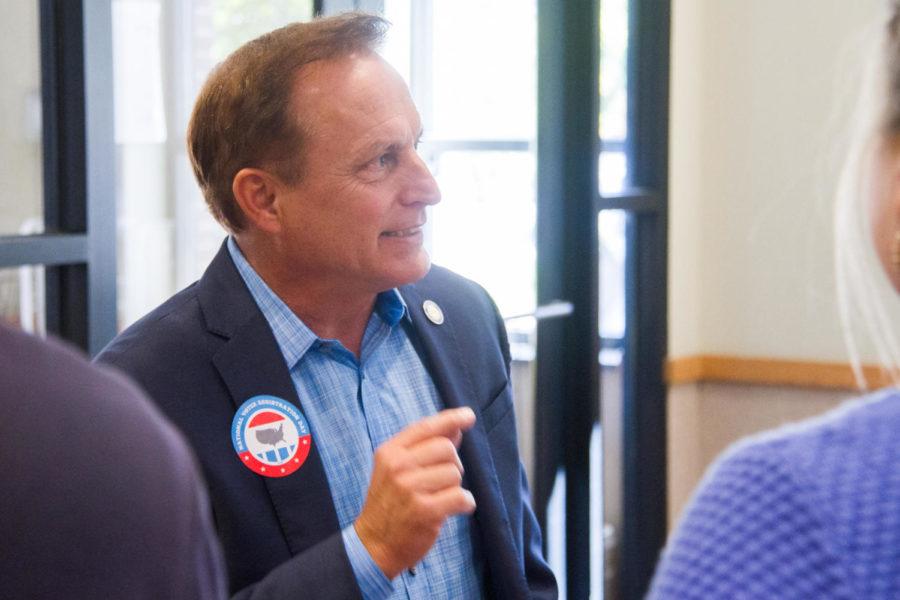Felker: Pate’s ‘voter integrity’ bill is unnecessary bilge
Iowa Secretary of State Paul Pate meets with voter registration volunteers, as part of National Voter Registration day, Sept. 27 in the UDCC. After briefly talking about the events of last night’s presidential debate, Pate talked with the volunteers about the importance of voting, and the power a voter has.
January 24, 2017
Every skeptic’s book of best practices has a special chapter reserved for all the inane, needless, counterproductive and senseless laws the legislature pushes through its knotted intestinal docket. New editions are issued on the first full moon of every July and December, on account of all the addendums.
This same book’s foreword lays out the maxim that any legislature of any significance, size or power must, as a rule, tend toward throwing its time and well-earned money in precisely all the wrong directions. Thankfully, there is generally little issue with this assumption because of all the practice most state legislatures have accrued doing so over their storied histories.
As Iowa Secretary of State Paul Pate’s recently proposed “voter integrity” bill looks to make its own entry in this ledger of nonsense, I would urge the Republican state representatives of Iowa, who now find themselves profiting from an energetic, unified majority, to reflect upon whatever supposed motivations reside in the deepest, darkest depths of their souls, regarding whatever supposed reasons they could use to rationalize voting in support of this legislation.
This bill of his is spurious, uncalled-for, a needless expense and will do more harm than whatever good its harebrained supporters have convinced themselves it might ever actually accomplish — in short, it is bunkum. It is one more roll of red tape to be wrapped around the poll booth’s door, and it will discourage voter turnout in the worst of ways and at the worst of times.
For the curious, here’s what the bill does (At the estimated start-up cost of $1 million state tax dollars, which anybody with sense could see to be an optimistic appraisal):
In the main, it requires all voters to present a valid form of identification at their polling center, excluding university student IDs for this use. Second, the bill would provide for the placement of electronic poll books in all precincts that haven’t already received them. And, according to the Des Moines Register, Pate’s proposed bill would also include:
“Creating a deadline for proxies to return collected voter registration forms and absentee ballots to the county auditor’s office.”
“Setting the first date to request absentee ballots at 120 days prior to an election.”
“Ensuring uniform, ongoing training for election staff and poll workers.”
And, finally, “Requiring that county auditors certify their compliance to all state and federal laws and report all suspected instances of election misconduct with the secretary of state.”
For some of what’s proposed here, there is no issue. But there is also no reason that the state shouldn’t be doing everything in its power to make voting an easier process than it already is — or, at the very least, as easy a process as it currently is. And, likewise, it is a preposterous claim to say that added, not less regulation, should be piled upon what Pate has actually recently praised as a successful, effective, judicious electoral system.
There are very few actual instances of voter fraud. All this legislation would accomplish would be an added layer of confusion and an added barrier to counting every voting-age citizen’s vote.
It simply doesn’t matter how easy it would hypothetically be to acquire a free voting ID or how little trouble these additional regulations would supposedly contribute to the process. Any sort of inconvenience, to any extent, would spell a reduced turnout. College students would be affected most on account of their transient addresses and being barred from using their university IDs as valid identification.
Voting is already a difficult enough affair. Bizarrely, the presidential election takes place on a business day, and the polls are often closed by early evening. Of course it would be ridiculous to make Election Day a federal holiday, or to hold it on a weekend. We’re far too stuck in our ways for such nonsense, and this bill is making the whole process even more byzantine than it already is, apparently, just appeals too much to our state’s current leadership.
So, on top of all three of Iowa’s state university presidents’ open letter in declaration of Pate’s bill’s absurdity, I would offer my own opinion in support of theirs.
















